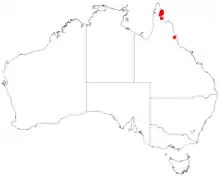Leptospermum purpurascens
Leptospermum purpurascens, commonly known as the purple-stemmed turkey bush,[2] is a shrub or small tree that is endemic to far north Queensland. It has bark that is purple when new, elliptical to broadly lance-shaped leaves, relatively small white flowers arranged in pairs and small fruit that falls from the plants when the seeds are released.
| Purple-stemmed turkey bush | |
|---|---|
| Scientific classification | |
| Kingdom: | Plantae |
| Clade: | Tracheophytes |
| Clade: | Angiosperms |
| Clade: | Eudicots |
| Clade: | Rosids |
| Order: | Myrtales |
| Family: | Myrtaceae |
| Genus: | Leptospermum |
| Species: | L. purpurascens |
| Binomial name | |
| Leptospermum purpurascens | |
 | |
| Occurrence data from AVH | |
Description
Leptospermum purpurascens is a shrub or small tree that typically grows to a height of 6 m (20 ft) with thin, rough bark that is shed annually to reveal shining purple new bark. Younger stems are hairy at first and have a conspicuous flange near each leaf base. The leaves are elliptical to broadly lance-shaped, about 10 mm (0.39 in) long, 2–4 mm (0.079–0.157 in) wide and glossy on the upper surface, silky hairy on the lower surface. The flowers white, sometimes reddish, 3–5 mm (0.12–0.20 in) wide and usually arranged in pairs. The floral cup is hairy, about 1.5 mm (0.059 in) long and the sepals are about 0.7 mm (0.028 in) long. The petals are about 1.5 mm (0.059 in) long and the stamens are 0.5–1 mm (0.020–0.039 in) long. Flowering occurs from June to July and the fruit is a capsule about 3 mm (0.12 in) in diameter with the remains of the sepals attached, but that falls from the plant when the seeds are released.[3]
Taxonomy and naming
Leptospermum purpurascens was first formally described in 1989 by Joy Thompson in the journal Telopea.[3][4] The specific epithet (purpurascens) is a Latin word meaning "purplish" or "becoming purple", referring to the colour of the new bark.[3][5]
Distribution and habitat
This tea-tree grows on rocky hillsides in far north Queensland.[3]
Conservation status
This species is classified as "least concern" under the Queensland Government Nature Conservation Act 1992.[6]
Use in horticulture
This species prefers moist, well-drained soil but is frost tender.[2]
References
- "Leptospermum purpurascens". Australian Plant Census. Retrieved 24 May 2020.
- "Leptospermum purpurascens - Purple-stemmed turkey bush". Australian National botanic Gardens. Retrieved 24 May 2020.
- Thompson, Joy (1989). "A revision of the genus Leptospermum (Myrtaceae)". Telopea. 3 (3): 355–356.
- "Leptospermum purpurascens". APNI. Retrieved 24 May 2020.
- William T. Stearn (1992). Botanical Latin. History, grammar, syntax, terminology and vocabulary (4th ed.). Portland, Oregon: Timber Press. p. 4760.
- "Species profile—Leptospermum purpurascens". Queensland Government Department of Environment and Science. Retrieved 24 May 2020.